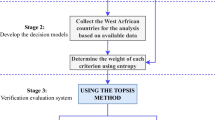Abstract
The concept of energy security has become an increasingly challenging issue in Africa, forcing energy-deficient countries to forge mutual partnerships with energy sufficient countries to access it for their domestic consumption. This study formulates a composite index of energy security in Africa as well as evaluates its impacts and trends using a sample of 28 countries on the continent, during the 2000–2018 period by using a principal composite factor analysis (PCA), with the series of 13 variables. Further interpretation was carried out using these tests: Kaiser-Meyer-Olkin measure of sampling adequacy and Bartlett’s test of sphericity, Pearson correlation test, and Cronbach’s alpha test. The key results show a trend of energy insecurity among the countries studied, as energy imports loads high in most countries as well as per capita emission, together with fossil fuel source consumption correlating high. These results validate the stark reality on the African continent. The inference from the results of the anaylsis conclude that the principal component analysis (PCA) results of the energy index were considered fit and reliable for the analysis, with the most important Cronbach’s alpha test coefficient of 0.8797, far above the standard 0.6 model reliability level. Based on this study, the paper proffers there should be increased intra-regional trading of energy among the various power pools on the continent and increased regional renewable energy investments as well as investment in energy infrastructure, measures to reduce electricity system losses, environmental sustainability, and the adoption of energy in efficiency on the continent.


Similar content being viewed by others
Data availability
The data that support the findings of this study are openly available on request.
References
Anser MK, Mohsin M, Abbas Q, Chaudhry IS (2020) Assessing the integration of solar power projects: SWOT-based AHP–F-TOPSIS case study of Turkey. Environ Sci Pollut Res 27:31737–31749. https://doi.org/10.1007/s11356-020-09092-6
AREI (2017) The Africa renewable energy initiative—setting the context. 1–16
Arminen H, Menegaki AN (2019) Corruption, climate and the energy-environment-growth nexus. Energy Econ 80:621–634. https://doi.org/10.1016/j.eneco.2019.02.009
Asbahi AAMHA, Gang FZ, Iqbal W et al (2019) Novel approach of principal component analysis method to assess the national energy performance via Energy Trilemma Index. Energy Rep 5:704–713. https://doi.org/10.1016/j.egyr.2019.06.009
Augutis J, Krikštolaitis R, Martišauskas L, Urbonienė S, Urbonas R, Ušpurienė AB (2020) Analysis of energy security level in the Baltic States based on indicator approach. Energy 199. https://doi.org/10.1016/j.energy.2020.117427
Aye GC, Gupta R, Wanke P (2018) Energy efficiency drivers in South Africa: 1965–2014. Energy Effic 11:1465–1482. https://doi.org/10.1007/s12053-018-9644-6
Azad MAK, Wanke P, Raihan MZ, Anwar SMR, Mustafa R (2020) Bank efficiency in Bangladesh revisited: a slack-based network DEA approach. J Econ Stud ahead-of-print. https://doi.org/10.1108/JES-01-2019-0029
Baloch ZA, Tan Q, Iqbal N, Mohsin M, Abbas Q, Iqbal W, Chaudhry IS (2020) Trilemma assessment of energy intensity, efficiency, and environmental index: evidence from BRICS countries. Environ Sci Pollut Res 27:34337–34347. https://doi.org/10.1007/s11356-020-09578-3
Bellos E (2018) Sustainable energy development: How can the tension between energy security and energy transition be measured and managed in South Africa? J Clean Prod 205:738–753. https://doi.org/10.1016/j.jclepro.2018.08.196
Blimpo MP, Cosgrove-davies M (2019) Electricity generation in Sub-Saharan Africa
Bohi DR, Toman MA (1996) The Economics of energy security. Econ Energy Secur 49:6221. https://doi.org/10.1007/978-94-009-1808-5
Bu M, Li S, Jiang L (2019) Foreign direct investment and energy intensity in China: firm-level evidence. Energy Econ 80:366–376. https://doi.org/10.1016/j.eneco.2019.01.003
Chaichana C, Wongsapai W, Damrongsak D, Ishihara KN, Luangchosiri N (2017) Promoting community renewable energy as a tool for sustainable development in rural areas of Thailand. Energy Procedia 141:114–118. https://doi.org/10.1016/j.egypro.2017.11.022
Diaz EM, Molero JC, Perez de Gracia F (2016) Oil price volatility and stock returns in the G7 economies. Energy Econ 54:417–430. https://doi.org/10.1016/j.eneco.2016.01.002
Energy A, Group W (2019) Emerging Energy security risks in changing energy landscape October 2019
Energy W, Special O (2019) Africa Energy Outlook 2019 Africa Energy Outlook 2019
Gasser P (2020) A review on energy security indices to compare country performances. Energy Policy 139:111339. https://doi.org/10.1016/j.enpol.2020.111339
Gracceva F, Zeniewski P (2014) A systemic approach to assessing energy security in a low-carbon EU energy system. Appl Energy 123:335–348. https://doi.org/10.1016/j.apenergy.2013.12.018
Guo M, van Dam KH, Touhami NO, Nguyen R, Delval F, Jamieson C, Shah N (2020) Multi-level system modelling of the resource-food-bioenergy nexus in the global south. Energy 197:117196. https://doi.org/10.1016/j.energy.2020.117196
Heffron RJ, McCauley D, Sovacool BK (2015) Resolving society’s energy trilemma through the Energy justice metric. Energy Policy 87:168–176. https://doi.org/10.1016/j.enpol.2015.08.033
Hill G, Heidrich O, Creutzig F, Blythe P (2019) The role of electric vehicles in near-term mitigation pathways and achieving the UK’s carbon budget. Appl Energy 251:113111. https://doi.org/10.1016/j.apenergy.2019.04.107
International Renewable Energy Agency (2020) Global renewables outlook: energy transformation 2050
International T, Energy R, Irena A (2018) Renewable power generation costs in 2018
Iqbal W, Yumei H, Abbas Q, Hafeez M, Mohsin M, Fatima A, Jamali M, Jamali M, Siyal A, Sohail N (2019) Assessment of wind energy potential for the production of renewable hydrogen in Sindh Province of Pakistan. Processes. 7. https://doi.org/10.3390/pr7040196
Iqbal N, Khan A, Gill AS, Abbas Q (2020) Nexus between sustainable entrepreneurship and environmental pollution: evidence from developing economy. Environ Sci Pollut Res. https://doi.org/10.1007/s11356-020-09642-y
Iram R, Zhang J, Erdogan S, Abbas Q, Mohsin M (2019) Economics of energy and environmental efficiency: evidence from OECD countries. Environ Sci Pollut Res 27:3858–3870. https://doi.org/10.1007/s11356-019-07020-x
IRENA (2014) Renewable power generation costs in 2018
IRENA (2019) Scaling up renewable energy development in Africa: Impact of IRENA’s Engagement. 1–4
Khraief N, Omoju OE, Shahbaz M (2016) Are fluctuations in electricity consumption per capita in Sub-Saharan Africa countries transitory or permanent? Energy Strateg Rev 13–14:86–96. https://doi.org/10.1016/j.esr.2016.08.007
Kuik OJ, Lima MB, Gupta J (2011) Energy security in a developing world. Wiley Interdiscip Rev Clim Chang 2:627–634. https://doi.org/10.1002/wcc.118
Lacher W, Kumetat D (2011) The security of energy infrastructure and supply in North Africa: hydrocarbons and renewable energies in comparative perspective. Energy Policy 39:4466–4478. https://doi.org/10.1016/j.enpol.2010.10.026
Le TH, Nguyen CP (2019) Is energy security a driver for economic growth? Evidence from a global sample. Energy Policy 129:436–451. https://doi.org/10.1016/j.enpol.2019.02.038
Le TH, Chang Y, Taghizadeh-Hesary F, Yoshino N (2019) Energy insecurity in asia: a multi-dimensional analysis. Econ Model 83:84–95. https://doi.org/10.1016/j.econmod.2019.09.036
Lee K, Miguel E, Wolfram CD (2017) Electrification and economic development: a microeconomic perspective. EEG State-of-Knowledge Pap Ser 1–36
Lee T, Glick MB, Lee JH (2020) Island energy transition: assessing Hawaii’s multi-level, policy-driven approach. Renew Sust Energ Rev 118:109500. https://doi.org/10.1016/j.rser.2019.109500
Marques C, Fuinhas A, Manso JRP (2010) Motivations driving renewable energy in European countries : A panel data approach. 38:6877–6885. https://doi.org/10.1016/j.enpol.2010.07.003
Meierding E (2011) Energy security and sub-saharan Africa. Rev Int Polit Dév 2:0–17. https://doi.org/10.4000/poldev.744
Mohsin M, Rasheed AK, Saidur R (2018a) Economic viability and production capacity of wind generated renewable hydrogen. Int J Hydrog Energy 43:2621–2630. https://doi.org/10.1016/j.ijhydene.2017.12.113
Mohsin M, Zhou P, Iqbal N, Shah SAA (2018b) Assessing oil supply security of South Asia. Energy 155:438–447. https://doi.org/10.1016/j.energy.2018.04.116
Mohsin M, Abbas Q, Zhang J, Ikram M, Iqbal N (2019a) Integrated effect of energy consumption, economic development, and population growth on CO2 based environmental degradation: a case of transport sector. Environ Sci Pollut Res 26:32824–32835. https://doi.org/10.1007/s11356-019-06372-8
Mohsin M, Rasheed AK, Sun H, Zhang J, Iram R, Iqbal N, Abbas Q (2019b) Developing low carbon economies: an aggregated composite index based on carbon emissions. Sustain Energy Technol Assess 35:365–374. https://doi.org/10.1016/j.seta.2019.08.003
Mohsin M, Zhang J, Saidur R, Sun H, Sait SM (2019c) Economic assessment and ranking of wind power potential using fuzzy-TOPSIS approach. Environ Sci Pollut Res 26:22494–22511. https://doi.org/10.1007/s11356-019-05564-6
Mohsin M, Taghizadeh-Hesary F, Panthamit N, Anwar S, Abbas Q, Vo XV (2020) Developing low carbon finance index: evidence from developed and developing economies. Financ Res Lett:101520. https://doi.org/10.1016/j.frl.2020.101520
Nagayama H (2009) Electric power sector reform liberalization models and electric power prices in developing countries. An empirical analysis using international panel data. Energy Econ 31:463–472. https://doi.org/10.1016/j.eneco.2008.12.004
GWEC(2019) Africa Wind Energy Handbook
Outlook BPE (2019) BP Energy Outlook—2019 Insights from the evolving transition scenario—Africa Africa’s net exports fall significantly even as production rises, due to its own consumption growing strongly: renewables become the largest source of power generation in 2040
Parry I (2006) Energy and security [3]. Issues Sci Technol 23:7–8
Rafiaani P, Kuppens T, Van Dael M et al (2018) Social sustainability assessments in the biobased economy: towards a systemic approach. Renew Sust Energ Rev 82:1839–1853
Sarangi GK, Mishra A, Chang Y, Taghizadeh-Hesary F (2019) Indian electricity sector, energy security and sustainability: an empirical assessment. Energy Policy 135:110964. https://doi.org/10.1016/j.enpol.2019.110964
Sarkodie SA, Adams S (2020) Electricity access and income inequality in South Africa: evidence from Bayesian and NARDL analyses. Energy Strat Rev 29:100480. https://doi.org/10.1016/j.esr.2020.100480
SEWEA (2019) South Africa’s utility-scale wind & re industry Key data as at March 2019. 1–2
Sovacool BK, Mukherjee I (2018) Conceptualizing and measuring Energy Security: A synthesized approach 36(8):5343–5355
Šprajc P, Bjegović M, Vasić B (2019) Energy security in decision making and governance—methodological analysis of energy trilemma index. Renew Sust Energ Rev 114:109341. https://doi.org/10.1016/j.rser.2019.109341
Stone JV (2018) Principal component analysis and factor analysis. Indep Compon Anal. https://doi.org/10.7551/mitpress/3717.003.0017
Streatfeild JEJ (2018) Low electricity supply in sub-saharan Africa: causes, implications, and remedies. J Int Commer Econ 1
Lord Stern (2006 ) Stern review : the economics of climate change
Sun HP, Tariq G, Haris M, Mohsin M (2019) Evaluating the environmental effects of economic openness: evidence from SAARC countries. Environ Sci Pollut Res 26:24542–24551. https://doi.org/10.1007/s11356-019-05750-6
Sun H, Mohsin M, Alharthi M, Abbas Q (2020a) Measuring environmental sustainability performance of South Asia. J Clean Prod 251:119519. https://doi.org/10.1016/j.jclepro.2019.119519
Sun H, Pofoura AK, Adjei Mensah I, Li L, Mohsin M (2020b) The role of environmental entrepreneurship for sustainable development: evidence from 35 countries in Sub-Saharan Africa. Sci Total Environ 741:140132. https://doi.org/10.1016/j.scitotenv.2020.140132
Sun L, Cao X, Alharthi M, Zhang J, Taghizadeh-Hesary F, Mohsin M (2020c) Carbon emission transfer strategies in supply chain with lag time of emission reduction technologies and low-carbon preference of consumers. J Clean Prod 264:121664. https://doi.org/10.1016/j.jclepro.2020.121664
Sun L, Qin L, Taghizadeh-Hesary F, Zhang J, Mohsin M, Chaudhry IS (2020d) Analyzing carbon emission transfer network structure among provinces in China: new evidence from social network analysis. Environ Sci Pollut Res 27:23281–23300. https://doi.org/10.1007/s11356-020-08911-0
Tergin D (2006) Ensuring Energy Security. Foreign Aff 85:69. https://doi.org/10.2307/20031912
Trotta G (2020) Assessing energy efficiency improvements and related energy security and climate benefits in Finland: an ex post multi-sectoral decomposition analysis. Energy Econ:86. https://doi.org/10.1016/j.eneco.2019.104640
Turton H, Barreto L (2006) Long-term security of energy supply and climate change. Energy Policy 34:2232–2250. https://doi.org/10.1016/j.enpol.2005.03.016
UNECA (2014) Energy Access and security in Eastern Africa. Status and Enhancement Pathways
Valadkhani A, Roshdi I, Smyth R (2016) A multiplicative environmental DEA approach to measure efficiency changes in the world’s major polluters. Energy Econ 54:363–375. https://doi.org/10.1016/j.eneco.2015.12.018
Nygaard, I (2017) How can we stimulate and exploit a market in Africa for small wind turbines
Wang XC, Klemeš JJ, Dong X, Fan W, Xu Z, Wang Y, Varbanov PS (2019) Air pollution terrain nexus: a review considering energy generation and consumption. Renew Sust Energ Rev 105:71–85. https://doi.org/10.1016/j.rser.2019.01.049
World Energy Council, Wyman, Oliver (2019) Trilemma Index 2019. Trilemma Index 1–79
World Bank (2018) The Energy Progress Report 2018. 171
Zachmann G, Serwaah A, Peruzzi M (2014) When and how to support renewables? Letting the data speak
World Energy Council
Author information
Authors and Affiliations
Contributions
David Ajene Alemzero: Conceptualization, data curation, methodology, writing—original draft. Huaping Sun: Data curation, visualization. Nadeem Iqbal: Visualization, supervision, editing. Muhammad Mohsin: Review and editing. Muhammad Nadeem: Writing—review and editing and software. Xuan Vinh Vo: Review and editing.
Corresponding authors
Ethics declarations
Ethical approval and consent to participate
We declare that we do not have human participants, human data, or human tissue involved in the study.
Competing interests
The authors declare that they have no conflict of interest.
Consent for publication
We do not have any individual person’s data in any form.
Additional information
Responsible Editor: Nicholas Apergis
Publisher’s note
Springer Nature remains neutral with regard to jurisdictional claims in published maps and institutional affiliations.
Rights and permissions
About this article
Cite this article
Alemzero, D.A., Sun, H., Mohsin, M. et al. Assessing energy security in Africa based on multi-dimensional approach of principal composite analysis. Environ Sci Pollut Res 28, 2158–2171 (2021). https://doi.org/10.1007/s11356-020-10554-0
Received:
Accepted:
Published:
Issue Date:
DOI: https://doi.org/10.1007/s11356-020-10554-0




